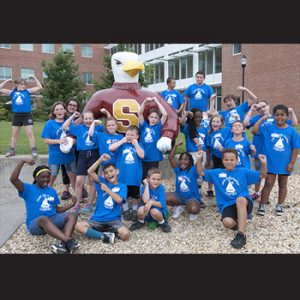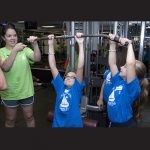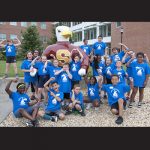
SALISBURY – There is always a child at camp who quietly holds back. When that camp is Camp Safe Harbor, a three-day program designed to help grieving children with remembrance and resilience after the death of a loved one, that child can be a source of concern.
After hearing from the child’s mother, however, the camp’s leaders knew they were helping. In a note to camp staff, she wrote, “My daughter’s personality and demeanor changed drastically with the loss and I was concerned I was losing her. After one day at your camp, you were able to give my daughter back to me. You saved her from the darkness she was in and brought the sunshine back into her life.”
That recovery meets an essential goal of the camp: helping children from the four Lower Shore counties who have endured the loss of someone close to them. Camp Safe Harbor is a partnership between the Social Work Department of Salisbury University and the Bereavement program at Coastal Hospice.

Campers learn to find resilience and strength after loss. In one exercise, they each discovered that even a heavy weight can be managed with the help of a friend.
University students enrolled in Children’s Grief and Bereavement course at SU have the opportunity to more deeply understand what they’ve learned by serving as counselors for Camp Safe Harbor, which was hosted by the university June 20-24. They join a team of Coastal Hospice staff and volunteers, beginning the week with a day of orientation and finishing with a day of debriefing and evaluation. Twenty-one children, ages 6-12, attended camp for the three days in the middle.
Each of those days is filled with activities, some inviting children to share their thoughts and memories. Dr. Kim van Vulpen is an Assistant Professor of Social Work at SU who developed the course and helped create the camp. She says students in the class who participate in camp get an opportunity “not only to learn about child development and the grief process but to apply what they learned in the classroom.”
The children’s feedback is also important. When asked about their favorite activities, one child chose “Captain of My Ship” as her favorite sharing activity. “I liked picking out who helps me,” she explained. Another said the balloon toss was his favorite game. When asked what they would say to a kid who is unsure about coming to camp next year, one child said “you get to meet some new friends and you learn how to express your feelings.” Another camper said “this camp will give back hope.”
Coastal Hospice Chaplain Sharon Hutchison worked with van Vulpen and Rev. Janelle Beiler to design Camp Safe Harbor.
“We try to create a balance,” says Hutchison. “The activities help them share their memories and develop a sense of healing. They also learn it’s okay to have fun, even though they feel sad about their loss. These children have taken quite a hit emotionally. We want to help them regain confidence.”

Camp Safe Harbor is hosted by Salisbury University’s Seidel School of Education and Professional Studies, with activities in Conway Hall and Maggs Physical Activity Center.
For its first year in 2015, the new program was offered only to children whose loved one had been in the care of Coastal Hospice, which is a departure for the organization, as all other grief support activities are open to the community. This year, Hutchison reached out to school guidance counselors and nurses, inviting them to share Camp Safe Harbor materials with the parents and guardians of children they thought would benefit. Hutchison or one of her colleagues met with the families to begin to build a relationship that would help the child attending camp.
The program was launched with a grant from the Community Foundation of the Eastern Shore and this year received support from the Gannett Foundation.
Coastal Hospice Social Worker Caitlin Jones was part of the Camp Safe Harbor team last year and returned this year. She’s noticed a subtle difference.
“I feel like the kids are more open this year than they were last year,” she says. “Maybe we’re different. Maybe it’s because this is a more diverse group.”
Camp Director Beiler agrees, saying, “We continue to hone our skills and improve this camp. The team seems more and more cohesive, perhaps because we have several returning camp veterans.”
The SU students admitted they had been unsure what to expect and were pleasantly surprised.
“I thought it would be much more somber,” said Catherine Sharkey.
Like Sharkey, Kassidy Ward will receive her bachelor’s degree in Social Work next year.
“I work now with teenagers, high school students,” she said. “I wasn’t sure about working with little kids. I loved it.”
As the children gathered to prepare for their families to arrive for the camp’s closing ceremony, van Vulpen pointed to one of the things that makes Camp Safe Harbor unique.
“This is their first time where they are actually in a group of kids who have all experienced a significant loss,” she pointed out. “Here, they don’t have to feel different.”
In fact, the room full of giggling, rambunctious children looked and sounded exactly like any summer camp.
Camp Safe Harbor receives additional support from donations to Coastal Kids Supportive Care, the pediatric program of Coastal Hospice.
Founded in 1980, Coastal Hospice is a nonprofit health care organization that cares for individuals facing life-limiting conditions but who want to remain as active and engaged as possible. Coastal Hospice cares for patients in their home, nursing home, assisted living facility or at Coastal Hospice at the Lake. The organization serves Wicomico, Worcester, Dorchester and Somerset counties.
